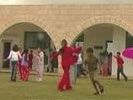Eye For Film >> Movies >> Bridge Over The Wadi (2006) Film Review
Sometimes, it's so hard to find the right words. Sometimes the right words don't exist. And sometimes, it is life and death for the future generations that depend on them.
Reviewing this film has been difficult. I apologise in advance for any inadvertent offence.

'Wadi' is an Arabic word. It means 'valley'. Where valleys can harbour flashfloods and landslides, the word conveys added danger. Wadi Ara is a particular wadi in Israel. It passes through Arab and Jewish towns near Haifa. In times when words have failed here, much fighting has ensued. Bloody, terrifying fighting.
Bridge Over The Wadi looks at a new way to find the right words. Words to cross borders.
It was originally a project by Hand in Hand Center. An educational venture to build peace and harmony through bilingual, multi-cultural schooling. It is a fly-on-the-wall account of life in and around a school in Wadi Ara.
Although Hand in Hand is bi-lateral, this film isn't. It's Israeli. This will immediately scream 'bias' to some audiences. But hold on a minute - and I say that sincerely as I am the most sceptical of audiences on such matters. As an Israeli film, I still feel it bends over backwards to illustrate both sides. Often quite emotionally. And the sincerity of all concerned can be painfully moving to behold.
Views expressed are mostly of the children. Children educated in each other's languages. Each other's religious beliefs. Respecting their own culture, but partaking fully - yes, fully - in the opposite culture.
"I'm a total atheist," says one parent. "But I'm Jewish." She is not making some subtle academic point about the separation of Jewish culture and religion. As a parent who's sent her child to Bridge over the Wadi school, she is already a 'tolerant' member of her community, and is consequently looked at askance by many of her neighbours. Yet her tolerance soon begins to waver. She exclaims that Arab parents must think she is "a sucker" for letting her Jewish kids say "Allah is great". We then hear from her the familiar, archetypal, emotional (if disingenuous) homilies about Exodus and about the Holocaust. She removes her child from school.
An Arab boy goes to lunch at his Jewish classmate's home. The boys just want to relax. Grandma, however well meaningly, interrogates him over his 'views' on terrorists. He squirms. This is a five-year-old child being made to feel guilty. But it is normal and reasonable from the grandma's perspective, with her look of fear and concern.
Arab parents have an opposite world view. However much they stick necks out by sending kids to this school, they understand Jews to be occupiers and aggressors.
Only when we contrast all the adults with the children do we see the former's deep-rooted and very unproductive sentiments.
Perhaps the most heart-rending footage is of a teachers' debate in the staffroom. Jewish and Arab tutors simultaneously teach all classes. Youngsters are required to help each other understand their opposite language and traditions. But when an Israeli teacher is off sick, it is clear that the predominant language is Hebrew. Arab children are making more effort to speak Hebrew than their Jewish counterparts to speak Arabic. The Arab teacher feels she is constantly covering for her Jewish opposite number, or making unfair concessions just to keep the peace.
Things come to a crunch over religious festivals, not unexpectedly. One particular memorial day is shared by both sides. For Jews, it is known as Independence Day. For Arabs, it is known as Nakba (catastrophe) Day.
Teachers look for language that simply expresses facts. Beliefs and emotions should be handled separately from history. The Arab teacher gets upset, shedding tears: "Left is not the same as uprooted!" That one small word offends. 'Uprooted' makes the Jews feel like wrongdoers. 'Left' suggests the displaced Arabs simply decided one day to leave the land of their own accord.
Bridge Over The Wadi packs a tremendous emotional punch. It doesn't offer complete answers. It does show a significant attempt to move forward in reciprocal understanding rather than mutual narrow-mindedness. My main criticism is that it still seems a little smug. It fails to give any noticeable credit to the Initiatives on which the documentary is based. It simplifies facts. For instance, considering the vast lengths Hand In Hand go to for accuracy, it seems disrespectful that filmmakers round out the numbers of pupils - applications 'doubled' in the second year - they actually increased very significantly. Or, suffering the little children perhaps, should they have omitted to mention that Christianity is also taught alongside Islam and Judaism?
But Bridge Over The Wadi is an impressive piece. One I recommend. It succeeds in presenting issues in a captivating way, without assuming detailed prior knowledge of Israeli-Palestinian relations.
One of the extraordinary things about five-year-olds anywhere is their sense of discovery about the world. Their unaffected and unconscious grasp of what is before their eyes. When they put their cross-border friendships before age-old enmity, the reasoning out of their mouths puts the complex negotiations of adults to shame.
Reviewed on: 14 Aug 2007
















